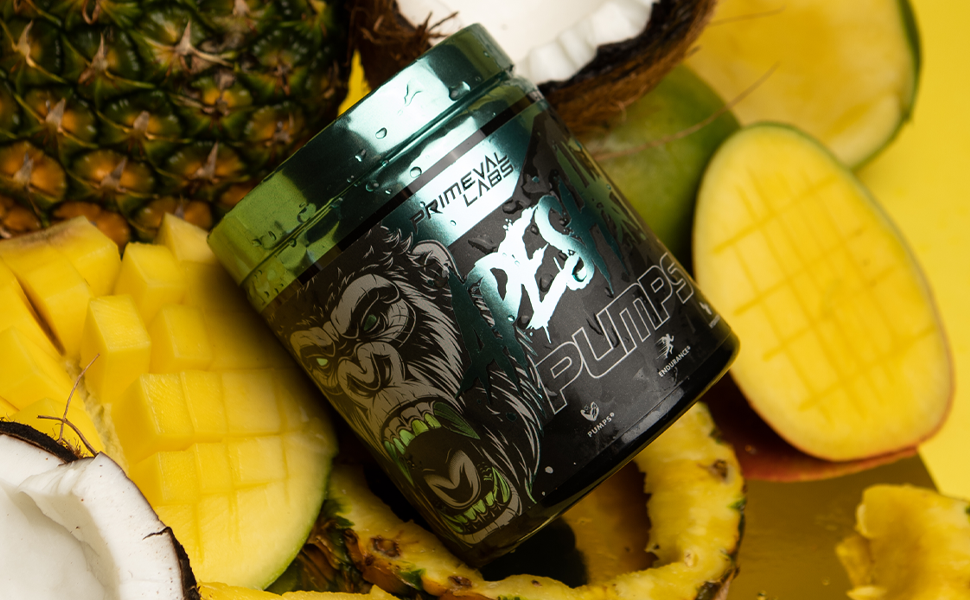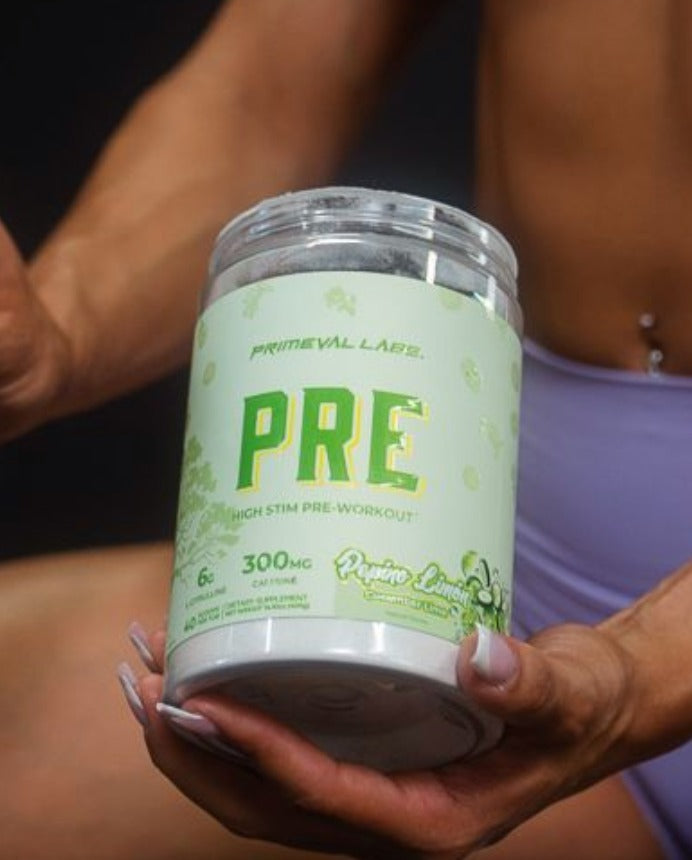Take a look at the best pre-workout supplements on the market and you’ll notice most (if not, all) of them share a few common ingredients noted in research to significantly enhance performance, power, and/or lean mass.
Today, we will take a deep dive into one of the most popular ingredients around -- L-Citrulline.
This mighty and versatile amino acid supports better workouts, faster recovery, and the most powerful muscle pumps ever experienced.
If you’re not familiar with this potent ergogenic, hang around, because we’ve got all the reasons why pre-workout with L-Citrulline is a must-have!
Boost Performance & Pumps
Ape Sh*t Untamed is a high energy, delicious tasting pre-workout citrulline supplement containing 4.5g L-Citrulline to support blood flow, muscle pumps, and athletic performance.
What is Citrulline?
L-citrulline is a nonessential amino acid, meaning the body can produce all it needs and is not required to obtain it through the diet.[1]
Citrulline is derived from the Latin word for watermelon (citrullus), and is found in relatively high amounts in the fruit, approximately 1.1-4.7mg/g.[2]
The amino acid is also found in a number of other common foods including:
- Cucumber
- Melons
- Pumpkin
- Squash
In the body, citrulline is produced in the liver and intestines from either L-Glutamine or L-Arginine.[1]
Interestingly enough, when ingested via supplementation, L-Citrulline is actually converted to L-arginine, which can then be used to support nitric oxide production, but we’ll discuss that in further detail a bit later.
L-citrulline plays a key role in the production of important enzymes, arginine levels, muscle strength, and cardiovascular health.
But, how can one “nonessential” amino acid have such a profound impact on the body?
Let’s find out!
What Does Citrulline Do in a Pre-workout?
Following ingestion, whether through supplementation or food, citrulline is converted to arginine by argininosuccinate lyase in the kidneys and released into the bloodstream, where it’s then put to use in the body for a number of different uses.[3,4]
Perhaps the most well known of these uses for citrulline is to increase nitric oxide (NO) production.
Since citrulline is converted into arginine, and L-Arginine is a precursor to nitric oxide, increased consumption of citrulline results in higher nitric oxide production[5]
Interestingly enough, citrulline is also formed as a byproduct of nitric oxide production. It can then be recycled back to L-Arginine by way of the Citrulline-NO cycle.[6]
Beyond supporting nitric oxide production, citrulline also plays a crucial role in the urea cycle along with the amino acids arginine and ornithine. The urea cycle is responsible for converting ammonia into urea, which is then excreted from the body through urine.
In case you weren’t aware, ammonia is a compound that can be extremely toxic to cells.
Elevated levels of ammonia in skeletal muscles can induce fatigue, inhibit energy production, and reduce glycogen formation.
If ammonia levels get too out of control, it can even cause premature cell death.
But with increased citrulline levels in the body, the body’s ability to buffer this ammonia buildup is significantly enhanced, which supports stamina, endurance, and all around athletic performance.
Citrulline also increases the rate of ATP synthesis during exercise as well as phosphocreatine (CP) recovery after exercise.[13]
An athlete’s inability to rapidly generate ATP will lead to premature fatigue and that quintessential feeling of "hitting the wall" during training.
L-Citrulline vs L-Arginine
Above, we mentioned that L-Citrulline is converted to L-Arginine which leads to greater NO production, and a number of important performance benefits, which will be addressed momentarily.
But you’re probably wondering why not simply use L-arginine to increase NO production instead of a compound that must first convert to L-Arginine and then nitric oxide.
Simply put, L-Arginine has incredibly poor bioavailability in the body (~20%) when orally supplemented, meaning that any free form L-Arginine supplement you take really won’t do much to increase blood levels of arginine.
This is due to L-arginine being quickly degraded by the actions of a devious little enzyme called arginase, which is present in the gut.[7]
L-citrulline, however, uses a different transporter in the gut when it is absorbed than L-arginine, which means it is not prematurely broken down and survives the tortuous journey through the digestive system and into your intestines.
From here, it can be absorbed and transported into the bloodstream and subsequently converted to arginine, and from there enhance NO production.[8]
Theoretically, you could still take L-Arginine to increase NO production, but you’d have to use a rather large dose of it (~10-20g).
The problem is, L-Arginine has some rather nasty side effects when taken in large doses including GI distress, nausea, vomiting, and diarrhea[9], not exactly something you want to deal with right before a heavy set of squats.
Citrulline, on the other hand, doesn’t have this problem when consumed at high doses.
In other words, Citrulline is a superior nitric oxide booster to arginine, and one that likely won’t cause any sort of stomach issues preceding your workout.
Now, let’s take a look at what this powerful amino acid can do for your performance and overall health.
Benefits of Citrulline
Increases Nitric Oxide Production
The most well known benefit of L-citrulline is its ability to significantly boost nitric oxide levels in the body.[10,11]
Why is more nitric oxide a good thing?
Nitric oxide is an important cell signaling molecule that enhances vasodilation, blood flow, oxygen delivery, nutrient transport, glucose uptake, and muscle growth.
Increased oxygen and nutrient delivery to working muscles allows them to resist fatigue and continue to perform at a high level, leading to more weight and reps performed and ultimately better gains.
Enhances Blood Flow
A by-product of increased nitric oxide production is greater blood flow.[10,11,12]
With increased blood flow comes a greater delivery of essential nutrients to your brain and skeletal muscles to help them function optimally and resist fatigue.
Furthermore, increased blood flow also helps increase amino acid delivery to your muscles, which provides more “building blocks” for your body to repair and grow muscle tissue during and after intense training.
Improve Athletic Performance
Numerous studies have shown that supplementing with L-citrulline significantly enhances resistance and endurance training.
One study in particular gave subjects a dose of 6g L-Citrulline malate and documented a 34% increase in ATP production.[13]
Another study using 6g of L-Citrulline (the same dose contained in Mega Pre!) observed improved V̇o2 kinetics, tolerance to intense exercise, and exercise performance in healthy adults.[17]
Other trials using L-Citrulline have noted increased exercise capacity in endurance activities (walking and cycling) and resistance training (bench press).[14,15,16]
Reduces Fatigue
Not only does L-Citrulline help you perform better for longer, it also reduces fatigue during exercise as well.
Double-blind, randomized control trials (the highest quality studies) found that consuming L-Citrulline prior to exercise reduced fatigue following intense training.
L-Citrulline increased production of creatine phosphate (CP), the storage form of creatine in skeletal muscles.[13]
Subjects using citrulline also were able to perform more reps and experienced less soreness following training.[15,16]
Supports Cardiovascular Health
One of the many benefits of increased nitric oxide production, aside from enhanced performance, is vasodilation, widening of the blood vessels.
This relaxation and widening of blood vessels helps lower blood pressure, both systolic and diastolic, which supports cardiovascular health.
As a result, l-citrulline is being explored for use in heart failure.[17,18].
Supports Cardiovascular Health
The heart is a vital muscle/organ in the body that’s responsible for pumping blood to all the areas of your body that allow you to perform at a high level and essentially stay alive. It turns out L-Citrulline can also improve the function and health of your heart too!
Research conducted in patients with heart failure noted that L-Citrulline improved function of the left and right ventricles as well as endothelial function.[19]
Another study conducted in heart failure patients found that citrulline reduced blood pressure in the pulmonary artery and increased the volume of blood pumped out of the right ventricle.[14,20]
Finally, a study in healthy middle-aged men found that supplementation with 5.6 grams of L-Citrulline per day improved arterial stiffness, independent of blood pressure.[10]
Support Immunity
In addition to improving performance, Citrulline may help prevent athletes from getting sick too!
Research on male cyclists found the consuming 6 grams L-Citrulline malate prior to training improved the function of neutrophils, an important class of white blood cells that fight infection.[21]
May Increase Growth Hormone
A different study conducted on cyclists found that L-Citrulline supplementation (in the form of 6 grams citrulline malate) led to greater elevations in growth hormone following exercise than the control group.
Growth hormone is an important anabolic hormone that promotes cell growth, cell reproduction, and cell regeneration, higher levels of this powerful hormone can lead to bigger, better muscle growth from your training.[22]
Researchers believe the increase in growth hormone is due to increased arginine levels in the body, as arginine inhibits the release of Growth Hormone-Inhibiting Hormone.
May Enhance Erectile Function
Not only does L-Citrulline enhance your performance in the gym, it may also give you a much needed boost in the bedroom too!
Research conducted in men age 55 and older found that supplementing with L-Citrulline (1.5 grams per day) improved erection hardness and symptoms of erectile dysfunction (ED).[23]
On top of that, some men even reported more satisfaction from sex and having more of it too! Some men reported having more sex after L-Citrulline administration as well as being more satisfied.
May Help with Urea Cycle Disorders
Being that L-Citrulline is one of the three primary amino acids needed for proper functioning of the urea cycle, it stands to reason that supplementation with the amino acid may help improve the function of the toxin removing cycle. And research backs that up too!
Studies show that supplementing with L-Citrulline enhances ammonia removal from the bloodstream as well as preventing accumulation of it.[1]
Dosing: How Much L-Citrulline Should Be in a Pre-Workout?
A wide range of L-Citrulline doses have been used in research studies, from as little as 1.5g per day all the way up to 10g pure L-Citrulline (the max effective dose)![8,24]
The general consensus is that the minimum effective dose of L-Citrulline is 3 grams per day.[24]
And while 3 grams of L-Citrulline may provide benefit, research also notes a dose-dependent elevation in plasma arginine levels, meaning higher doses of L-Citrulline lead to greater increases in arginine, up to a dose of 10 grams per day.[8,24]
Additionally, research has found that a dose of 6 grams of L-Citrulline can increase blood flow, improve V̇o2 kinetics, and enhance exercise performance.[17,25]
That’s why Primeval Labs has included a full 4g dose and more of L-Citrulline in each serving of Ape Sh*t Untamed Pre-Workout Powder and Ape Sh*t Pumps Caffeine Free Preworkout Powder.
Any Side Effects?
Citrulline is considered safe for most people to use.
The only minor side effect that has been reported on occasion is some minor GI upset, though nowhere near the extent of arginine.[15,18].
L-Citrulline vs Citrulline Malate
Quite frequently, you’ll see supplements using Citrulline Malate as opposed to L-Citrulline and you might be wondering if one is better than the other.
Citrulline Malate is a combination of L-Citrulline and malic acid (malate). The difference being that you typically get about half the dose of citrulline with citrulline malate compared to pure l-citrulline.
For example, if you have 6g citrulline malate, you’re only getting around 3g L-Citrulline (assuming they’re using the typical 1:1 citrulline to malate ratio), with the other 3g being malic acid.
However, when using pure L-Citrulline, you get the full 6g.
Simply put, if you’re using citrulline malate, you’re going to have to use A LOT more of it to get the same yield of citrulline from the same amount of pure L-Citrulline.
Experience the Power of Citrulline with Ape Sh*t
L-Citrulline is a powerful amino acid, and one every athlete can stand to benefit from implementing into their training.
Primeval Labs Ape Sh*t Untamed Preworkout Powder and Ape Sh*t Pumps Pre-Workout Powder each include a heaping 4g and more of pure L-Citrulline in every full serving to promote greater nitric oxide production, blood flow, performance, and muscle pumps.
Try a serving today, and experience first hand all the benefits L-Citrulline has to offer.
Get your L-Citrulline pre-workout here!
References
- Oketch-Rabah HA, Roe AL, Gurley BJ, Griffiths JC, Giancaspro GI. The Importance of Quality Specifications in Safety Assessments of Amino Acids: The Cases of l-Tryptophan and l-Citrulline. J Nutr. 2016;146(12):2643S-2651S. doi:10.3945/jn.115.227280.
- Kobayashi Y, Narita K, Chiba K, Takemoto H, Morita M, Morishita K. Effects of L-citrulline diet on stress-induced cold hypersensitivity in mice. Pharmacognosy Research. 2014;6(4):297-302. doi:10.4103/0974-8490.138269.
- Eberhardt D, Jensen JVK, Wendisch VF. L-citrulline production by metabolically engineered Corynebacterium glutamicum from glucose and alternative carbon sources. AMB Express. 2014;4:85. doi:10.1186/s13568-014-0085-0.
- Curis E, Nicolis I, Moinard C, et al. Almost all about citrulline in mammals. Amino Acids. 2005;29(3):177-205. doi:10.1007/s00726-005-0235-4.
- National Center for Biotechnology Information. PubChem Compound Database; CID=9750, https://pubchem.ncbi.nlm.nih.gov/compound/9750
- Mori M, Gotoh T. Regulation of nitric oxide production by arginine metabolic enzymes. Biochem Biophys Res Commun. 2000;275(3):715-719. doi:10.1006/bbrc.2000.3169.
- Tangphao O, Grossmann M, Chalon S, Hoffman BB, Blaschke TF. Pharmacokinetics of intravenous and oral l-arginine in normal volunteers. British Journal of Clinical Pharmacology. 1999;47(3):261-266. doi:10.1046/j.1365-2125.1999.00883.x.
- Schwedhelm E, Maas R, Freese R, et al. Pharmacokinetic and pharmacodynamic properties of oral L-citrulline and L-arginine: impact on nitric oxide metabolism. British Journal of Clinical Pharmacology. 2008;65(1):51-59. doi:10.1111/j.1365-2125.2007.02990.x.
- Grimble GK. Adverse gastrointestinal effects of arginine and related amino acids. J Nutr. 2007;137(6 Suppl 2):1693S-1701S.
- Ochiai M, Hayashi T, Morita M, et al. Short-term effects of L-citrulline supplementation on arterial stiffness in middle-aged men. Int J Cardiol. 2012;155(2):257-261. doi:10.1016/j.ijcard.2010.10.004.
- El-Hattab AW, Emrick LT, Hsu JW, et al. Impaired nitric oxide production in children with MELAS syndrome and the effect of arginine and citrulline supplementation. Molecular genetics and metabolism. 2016;117(4):407-412. doi:10.1016/j.ymgme.2016.01.010.
- Seddon M, Melikian N, Dworakowski R, et al. Effects of neuronal nitric oxide synthase on human coronary artery diameter and blood flow in vivo. Circulation. 2009;119(20):2656-2662. doi:10.1161/CIRCULATIONAHA.108.822205.
- Bendahan D, Mattei J, Ghattas B, Confort-Gouny S, Le Guern ME, Cozzone P. Citrulline/malate promotes aerobic energy production in human exercising muscle. British Journal of Sports Medicine. 2002;36(4):282-289. doi:10.1136/bjsm.36.4.282.
- Orozco-Gutierrez JJ, Castillo-Martinez L, Orea-Tejeda A, et al. Effect of L-arginine or L-citrulline oral supplementation on blood pressure and right ventricular function in heart failure patients with preserved ejection fraction. Cardiol J. 2010;17(6):612-618.
- Perez-Guisado J, Jakeman PM. Citrulline malate enhances athletic anaerobic performance and relieves muscle soreness. J strength Cond Res. 2010;24(5):1215-1222. doi:10.1519/JSC.0b013e3181cb28e0.
- Suzuki T, Morita M, Kobayashi Y, Kamimura A. Oral L-citrulline supplementation enhances cycling time trial performance in healthy trained men: Double-blind randomized placebo-controlled 2-way crossover study. Journal of the International Society of Sports Nutrition. 2016;13:6. doi:10.1186/s12970-016-0117-z.
- Bailey SJ, Blackwell JR, Lord T, Vanhatalo A, Winyard PG, Jones AM. l-Citrulline supplementation improves O2 uptake kinetics and high-intensity exercise performance in humans. J Appl Physiol. 2015;119(4):385-395. doi:10.1152/japplphysiol.00192.2014.
- Alsop P, Hauton D. Oral nitrate and citrulline decrease blood pressure and increase vascular conductance in young adults: a potential therapy for heart failure. European Journal of Applied Physiology. 2016;116:1651-1661. doi:10.1007/s00421-016-3418-7.
- Balderas-Munoz K, Castillo-Martinez L, Orea-Tejeda A, et al. Improvement of ventricular function in systolic heart failure patients with oral L-citrulline supplementation. Cardiol J. 2012;19(6):612-617.
- Orea-Tejeda A, Orozco-Gutierrez JJ, Castillo-Martinez L, et al. The effect of L-arginine and citrulline on endothelial function in patients in heart failure with preserved ejection fraction. Cardiol J. 2010;17(5):464-470.
- Sureda A, Cordova A, Ferrer MD, et al. Effects of L-citrulline oral supplementation on polymorphonuclear neutrophils oxidative burst and nitric oxide production after exercise. Free Radic Res. 2009;43(9):828-835. doi:10.1080/10715760903071664.
- Sureda A, Cordova A, Ferrer MD, Perez G, Tur JA, Pons A. L-citrulline-malate influence over branched chain amino acid utilization during exercise. Eur J Appl Physiol. 2010;110(2):341-351. doi:10.1007/s00421-010-1509-4.
- Cormio L, De Siati M, Lorusso F, et al. Oral L-citrulline supplementation improves erection hardness in men with mild erectile dysfunction. Urology. 2011;77(1):119-122. doi:10.1016/j.urology.2010.08.028.
- Allerton TD, Proctor DN, Stephens JM, Dugas TR, Spielmann G, Irving BA. l-Citrulline Supplementation: Impact on Cardiometabolic Health. Nutrients. 2018;10(7):921. Published 2018 Jul 19. doi:10.3390/nu10070921
- Gonzales JU, Raymond A, Ashley J, Kim Y. Does l-citrulline supplementation improve exercise blood flow in older adults?. Exp Physiol. 2017;102(12):1661–1671. doi:10.1113/EP086587












Leave a comment
This site is protected by hCaptcha and the hCaptcha Privacy Policy and Terms of Service apply.